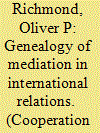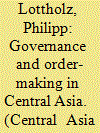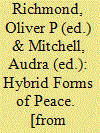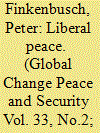|
|
|
Sort Order |
|
|
|
Items / Page
|
|
|
|
|
|
|
| Srl | Item |
| 1 |
ID:
160807


|
|
|
|
|
| Summary/Abstract |
What does it mean to mediate in the contemporary world? During the Cold War, and since, various forms of international intervention have maintained a fragile strategic and territorially sovereign balance between states and their elite leaders, as in Cyprus or the Middle East, or built new states and inculcated new norms. In the post-Cold War era intervention and mediation shifted beyond the balance of power and towards the liberal peace, as in Bosnia-Herzegovina, Kosovo, and Timor Leste. In the case of Northern Ireland, identity, territorial sovereignty, and the nature of governance also began to be mediated, leading to hints of complex, post-liberal formulations. This article offers and evaluates a genealogy of the evolution of international mediation.
|
|
|
|
|
|
|
|
|
|
|
|
|
|
|
|
| 2 |
ID:
173339


|
|
|
|
|
| Summary/Abstract |
This forum brings together five different angles on the question as to whether and how political regimes and forms of order-making can and should be researched through the concept of ‘illiberalism’. The discussion engages critically with this and associated concepts, such as ‘illiberal peace’ and ‘authoritarian conflict management’, which have been developed out of the Central Asian / Eurasian context and discussed in their wider global ramifications and, within the framing of ‘illiberal peace’, explored in various contexts in and beyond Central Asia. While further assessing the relevance and implications of this approach, this forum also attempts to think beyond ‘illiberalism’ by introducing and discussing the idea of ‘post-liberalism’. This way, the authors engage in an exchange that serves to probe both concepts and to determine their strengths and limitations when it comes to analysing and understanding politics and societal processes in Central Asia.
|
|
|
|
|
|
|
|
|
|
|
|
|
|
|
|
| 3 |
ID:
114539


|
|
|
|
|
| Publication |
United Kingdom, Palgrave Macmillan, 2012.
|
| Description |
x, 311p.Hbk
|
| Series |
Rethinking Peace and Conflict Studies
|
| Standard Number |
9780230282285
|
|
|
|
|
|
|
|
|
|
|
|
Copies: C:1/I:0,R:0,Q:0
Circulation
| Accession# | Call# | Current Location | Status | Policy | Location |
| 056793 | 327.172/RIC 056793 | Main | On Shelf | General | |
|
|
|
|
| 4 |
ID:
178400


|
|
|
|
|
| Summary/Abstract |
Focusing on post-Cold War international interventions, this article traces the emergence of a malaise within the liberal universal project. While it is agreed that the liberal peace is in crisis, there is disagreement on the nature of the impasse. For mainstream IR scholars, there is a resistance by actors in the Global South to follow the policy dictates of powerful Western governments and the international organisations they dominate. While this is certainly the case, this article argues that the crisis of the liberal peace is also rooted in the erosion of liberal universal foundations. In addition to liberal norms being rejected by Southern actors, the liberal peace crisis reflects a deeper scepticism on the part of international policy elites regarding the ability of liberal market democracy to resolve a wide range of social, political and economic problems. In addition to being a crisis of legitimacy between the Global North and the Global South, there seems to exist an erosion of liberal universal foundations which is undermining the ability of international policy elites to act purposively in global affairs. This argument is drawn out with reference to post-liberal approaches to peacebuilding which foreground the radical potential of non-liberal forms of agency.
|
|
|
|
|
|
|
|
|
|
|
|
|
|
|
|
|
|
|
|
|